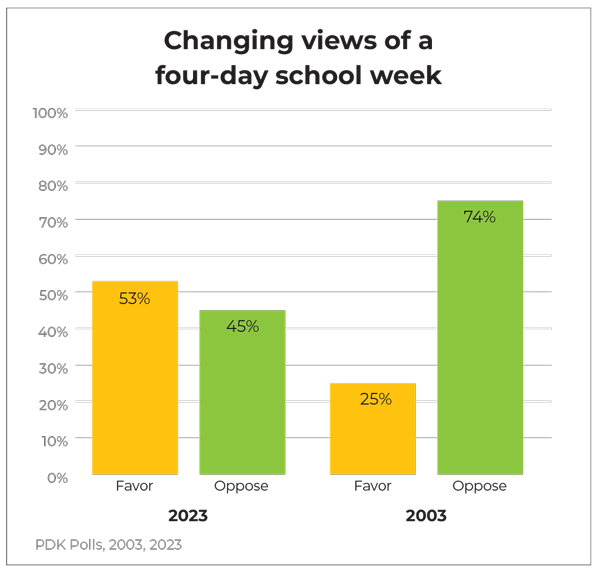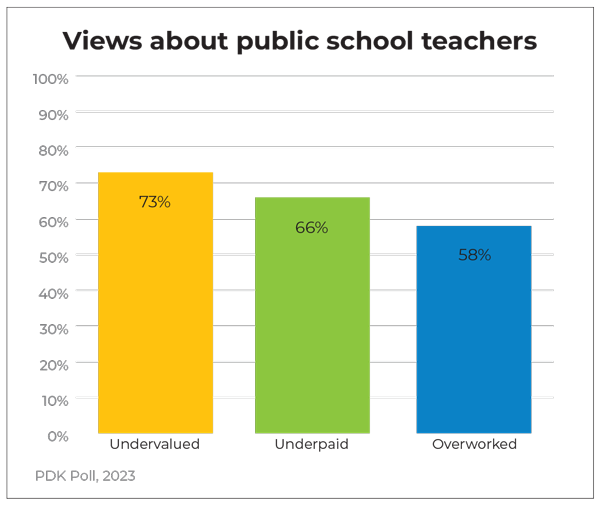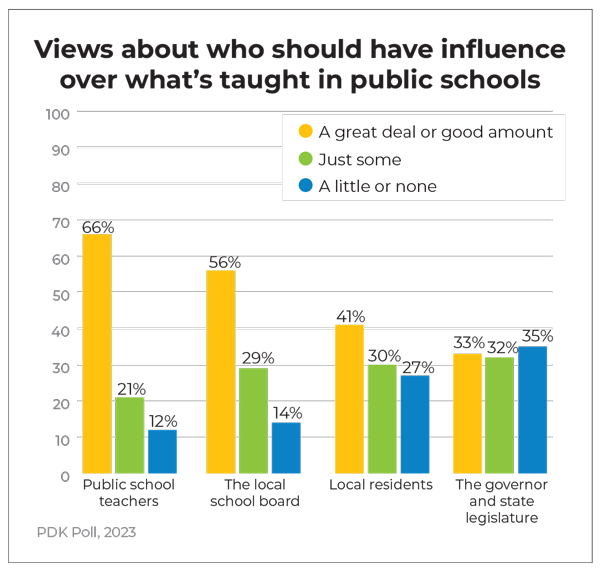PDK Poll of the Public’s Attitudes Toward the Public Schools
The 55th Annual PDK Poll
Continued support for teachers; growing support for a four-day school week
A wide majority (66%) of adults say teachers should have a substantial say in what’s taught in public schools, more than say so about school boards, local residents, or lawmakers. Indeed, on the 2023 PDK Poll on Public Attitudes Toward Public Education, teachers garnered twice as much support as influences than state governors and legislatures, who finish last on the list. Yet a slim majority (51%) supports state laws regarding what teachers can and cannot teach.
 Support for teachers also is apparent in another result from the 55th Annual PDK Poll: 67% of respondents support increasing local teacher salaries by raising property taxes. That result reflects the public’s broad sense that public school teachers are undervalued, underpaid, and overworked.
Support for teachers also is apparent in another result from the 55th Annual PDK Poll: 67% of respondents support increasing local teacher salaries by raising property taxes. That result reflects the public’s broad sense that public school teachers are undervalued, underpaid, and overworked.
At the same time, more than half of Americans support shifting to a four-day school week in their community, nearly twice as many as said so two decades ago. This change would reflect a fundamental shift in the structure of public education in the U.S.
Structurally, beyond a four-day week, the poll finds that about six in 10 adults support other changes in how schools operate — longer school days and/or a longer school year — as ways to try to improve student learning outcomes. However, the public fragments between one or the other of those options, or both together.
On another topic, results show widespread support for schools conducting mental health assessments of students, but with a division as to whether these should be done only for students whose parents or guardians request it (45%) or for all students (39%). Just 14% prefer no mental health assessments at all.
The survey was produced by Langer Research Associates for PDK International, with data collected June 16-25, 2023, in English and Spanish, among a representative, random national sample of 1,002 adults.
Alternative school schedules
 The biggest change over time is in the number of Americans who support a four-day school week with longer school days, up dramatically from 25% in a PDK/Gallup Poll in 2003 to 53% now, a roughly twofold increase.
The biggest change over time is in the number of Americans who support a four-day school week with longer school days, up dramatically from 25% in a PDK/Gallup Poll in 2003 to 53% now, a roughly twofold increase.
Perhaps surprisingly, results don’t differ substantially among Americans who have a child younger than 18 living at home. Fifty percent in this group support a four-day school week with longer school days, as do 54% of those without a child at home.
This question has a large gap by age: Among adults younger than 30, 63% favor a four-day school week, compared with 41% of those age 65 and older. In other differences, support is 12 percentage points higher among adults without a college degree than among college graduates, 57% versus 45%; it also slips to 45% among those who identify themselves as conservatives, compared with 55% among liberals and 58% of moderates.
Four-day school weeks have gained popularity since the COVID-19 pandemic; they’re reportedly in place in more than 1,600 schools in approximately 850 school districts, up from 650 districts in 2020 (Gunter et al, n.d.; National Conference of State Legislatures, 2023). Still, that represents only a tiny slice of the roughly 13,000 districts and 99,000 K-12 public schools in the U.S. (National Center for Education Statistics, 2022).
Longer school days or school years
In another question, 62% of adults support longer school days, longer school years, or both as ways to try to improve student learning outcomes, while 36% oppose any of these. Still, the majority fractures on the best approach: 26% prefer a longer school year only, 19% prefer longer school days only, and 17% both.
Among demographic differences, preference for some change is highest among liberals (70%); people with postgraduate degrees (71%); Democrats (69%); and those living in the West (66%). Results again are similar among people who have a child at home (60% favor a change) and those who do not (62% in favor).
In other groups, Black adults are particularly likely to prefer both longer school days and a longer school year combined. Twenty-six percent favor both options, compared with 16% of whites and 13% of Hispanic adults.
Views about public school teachers
 Most Americans express compassion for public school teachers. About three-quarters say they are undervalued in society, 66% say teacher salaries in their community are too low, and 58% think teachers in their area are overworked.
Most Americans express compassion for public school teachers. About three-quarters say they are undervalued in society, 66% say teacher salaries in their community are too low, and 58% think teachers in their area are overworked.
The number who say teachers are underpaid is unchanged from the 2018 PDK Poll, remaining at its highest level in 10 PDK and PDK/Gallup polls to ask the question since 1969. It’s more than double its low point, 29%, in the 1981 PDK/Gallup poll.
Views on the topic are intertwined. People who say teachers are overworked are more likely than others to also say they’re undervalued (91% versus 48%) and more likely to say they’re underpaid (90% versus 33%).
Among groups, women are 12 percentage points more likely than men to say teachers are undervalued and 13 points more likely to say they’re overworked. Political differences emerge here as well: Democrats are 17 percentage points more likely than Republicans to say teachers in their community are overworked and 18 percentage points more likely to say they are undervalued.
Teacher salaries
Given views on how teachers are valued, it follows that a substantial majority of Americans, 67%, support increasing teacher salaries in their community by raising local property taxes. Twenty-four percent strongly support this versus 11% strongly opposed.
 The result echoes a variety of similar poll findings in recent years. In PDK Polls in 2018 and 2019, for instance, about seven in 10 Americans said they would support teachers in their community going on strike for higher pay.
The result echoes a variety of similar poll findings in recent years. In PDK Polls in 2018 and 2019, for instance, about seven in 10 Americans said they would support teachers in their community going on strike for higher pay.
Such sentiments follow prominent reports of the economic challenges facing teachers. A 2022 report by the U.S. Census Bureau, for example, stated, “Although teachers are among the nation’s most educated workers, they earn far less on average than most other highly educated workers and their earnings have declined since 2010” (Newburger & Backhusen, 2022).
There is a strong partisan aspect to views on raising teacher pay via higher property taxes, which provide a substantial portion of public school funding. Eighty-three percent of Democrats are in favor, declining to 67% of independents, and falling further to 48% of Republicans. Results are similar by ideology, with 86% of liberals in favor, compared with 70% of moderates and 48% of conservatives.

Support for raising teacher salaries is closely associated with sensitivity toward their current working conditions. It reaches 85% among those who feel teachers are underpaid, 84% among those who say they’re overworked, and 81% among those who say they’re undervalued in society.
Support for raising teacher pay also is elevated among those who perceive a shortage of teachers in their community as problematic. Among those who see this as either a crisis or a serious problem, 83% support raising teacher salaries through higher property taxes. This declines to 51% — still a majority, albeit barely — among those who see teacher shortages as less of a problem.
That said, the public divides on the severity of teacher shortages: 51% call it either a crisis (16%) or a serious problem but not a crisis (35%). Nearly as many, 47%, call it either not a serious problem (31%) or not a problem at all (16%). Partisanship and ideology again are big factors; having a child younger than 18 at home is not.
Curriculum influence
Regarding influence on school curriculum, a hot political topic, 66% of Americans say public school teachers should have a great deal or good amount of influence in deciding what’s taught in public schools. That surpasses the number who say the same about the local school board (56%); local residents (41%); and the governor and state legislature (33%).
 Majorities across the political spectrum say teachers should have substantial say in what’s taught — 75% of Democrats, 64% of independents, and 60% of Republicans. The gap between Democrats and Republicans was similar when it comes to the local school board, although the majorities saying school boards should have a great deal or good amount of influence were smaller.
Majorities across the political spectrum say teachers should have substantial say in what’s taught — 75% of Democrats, 64% of independents, and 60% of Republicans. The gap between Democrats and Republicans was similar when it comes to the local school board, although the majorities saying school boards should have a great deal or good amount of influence were smaller.
By contrast, Republicans (53%) are more likely than independents (42%) or Democrats (32%) to say local residents should have substantial influence on what’s taught. On the last item, influence by the governor and state legislature, support is low across groups.
At the same time, this doesn’t mean the majority sees no place at all for legislative involvement. In a separate question, 51% say there should be state laws setting rules on what public school teachers can and cannot teach versus 47% who say they should be permitted to teach their subjects as they think best.
Republicans are more likely (71%) than independents (49%) and Democrats (38%) to favor state laws setting rules on what teachers can and cannot teach. Divisions by ideology are similar. In a notable gap by race/ethnicity, 64% of Hispanics opt for state laws in this regard, versus 38% of Black people. Whites are between the two, at 51%.

Mental health assessments
The survey, lastly, looks at the topic of mental health assessments of students. Eighty-four percent of respondents favor such assessments in some form, albeit with a sharp division on conditions: 45% say schools should conduct such assessments only when a student’s parents or guardians request it, while 39% say they should be done for all students.
As with many results of this survey, differences in response by partisanship and ideology stand out. Twenty-nine percent of Republicans and conservatives alike favor mental health assessments of all students. This rises to about four in 10 apiece among independents and moderates and 47% of both Democrats and liberals.
References
Gunter, K., Schuna, J., Thompson, P.N., Tomayko, E., & Ward, J. (n.d.). Four-day school week policy. Hallie E. Ford Center for Healthy Children and Families, Oregon State University.
National Center for Education Statistics. (2022). Table 214.10. Number of public school districts and public and private elementary and secondary schools: Selected school years, 1869-70 through 2021-22. Digest of Education Statistics. U.S. Department of Education.
National Conference of State Legislatures. (2023, June 28). Four-day school week overview.
Newburger, J.C. & Beckhusen, J. (2022). Teachers are among most educated, yet their pay lags. U.S. Census Bureau.
Methodology and topline
The 2023 Phi Delta Kappa poll was produced for PDK by Langer Research Associates via the nationally representative Ipsos KnowledgePanel®, in which participants are randomly recruited via address-based sampling to respond to survey questionnaires online. Households without internet connections are provided with a web-enabled device and service.
The survey was designed to consist of approximately 1,000 adults. Field work was conducted June 16-25, 2023. Out of 1,637 panel members invited to participate, completed, qualified surveys were provided by 1,014.
The 12 panelists who completed the survey in less than a quarter of the median completion time or who skipped more than three-quarters of the questions were deleted in quality control. The final sample included 1,002 U.S. adults.
Data were weighted via iterative proportional fitting to the following benchmark distributions of adults from the U.S. Census Bureau’s 2022 Current Population Survey:
- Gender (male, female) by age (18-29, 30-44, 45-59, 60+)
- Race/ethnicity (white, Black, Hispanic)
- Education (high school or less, some college, bachelor or higher)
- Household income ($0-$24,999, $25K-$49,999, $50K-$74,999, $75K-$99,999, $100K-$149,999, $150K+)
- Census Region (Northeast, Midwest, South, West)
The survey has a design effect due to weighting of 1.05, for a margin of sampling error of plus or minus 3.2 percentage points for the full sample. Error margins are larger for subgroups. Sampling error is not the only source of differences in polls.
PDF: Topline Survey Data
PDF: Survey Questions
About the PDK Poll
The PDK Poll of the Public’s Attitudes Toward the Public Schools has been a steady reflection of U.S. opinion about public education since 1969. PDK produces the annual poll as part of its mission to engage educators and serve schools so every student thrives. The PDK Poll results provide researchers with some of the finest longitudinal data on how the public feels about the nation’s schools and education policies. Education policy makers use the poll’s findings to inform their decisions, and educators across the country use the results to guide planning and action in their communities. Since 2016, Langer Research Associates has produced the poll for PDK.


